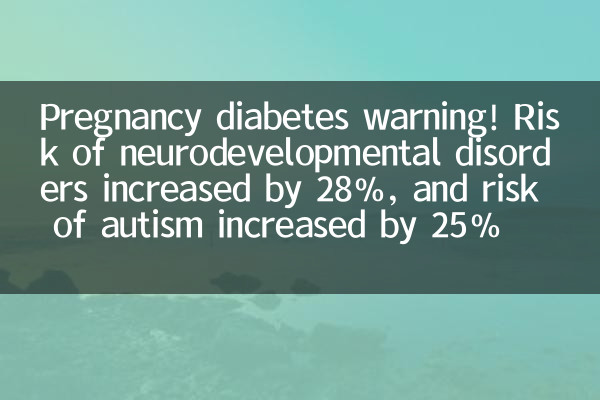Pregnancy diabetes warning! Risk of neurodevelopmental disorders increased by 28%, and risk of autism increased by 25%
Recently, a study on the association between pregnancy diabetes and offspring neurodevelopmental disorders has attracted widespread attention. Studies have shown that diabetes during pregnancy may significantly increase the risk of neurodevelopmental disorders in offspring, including autism, attention deficit hyperactivity disorder (ADHD). This discovery provides a new scientific basis for maternal health management, and also reminds the public to pay attention to screening and intervention of diabetes during pregnancy.
Research data overview

Here are key data statistics from the study that show the specific association between diabetes during pregnancy and risk of neurodevelopmental disorders in offspring:
| Risk Type | Risk increase percentage | Study sample size |
|---|---|---|
| Neurodevelopmental disorders (overall) | 28% | 50,000+ examples |
| Autism Spectrum Disorder (ASD) | 25% | 30,000+ examples |
| Attention deficit hyperactivity disorder (ADHD) | 20% | 40,000+ examples |
| Language development delay | 15% | 25,000+ examples |
The hazards and prevention of diabetes during pregnancy
Pregnancy diabetes (GDM) refers to the phenomenon that there is no history of diabetes before pregnancy, but there is an increase in blood sugar during pregnancy. If timely intervention is not done, the hyperglycemia environment may have a negative impact on fetal brain development and increase the risk of neurodevelopmental disorders. The following are the main hazards and preventive measures of diabetes during pregnancy:
1.harm:- The fetus is exposed to a hyperglycemia environment for a long time, which may affect neuronal development. - Increase the risk of complications such as premature birth and huge babies. - The probability of mothers suffering from type 2 diabetes in the future is significantly higher.
2.Preventive measures:- Regular blood sugar screening, especially for 24-28 weeks of pregnancy. - Maintain a balanced diet and reduce high sugar and high fat intake. - Moderate exercise, such as walking, yoga for pregnant women, etc. - Use insulin or oral hypoglycemic drugs as required as required.
Expert advice and public response
In response to this research result, domestic and foreign experts have called for strengthening early screening and intervention for diabetes during pregnancy. The American Society of Obstetricians and Gynecologists (ACOG) recommends that all pregnant women should undergo oral glucose tolerance test (OGTT) in the second trimester to detect and control blood sugar abnormalities in a timely manner.
The public's response to this study was also quite enthusiastic. Many expectant mothers said they will pay more attention to diet and blood sugar monitoring during pregnancy, and some medical institutions have begun to promote health education courses for diabetes during pregnancy. On social media, the number of discussions on topics such as #Pregnancy Diabetes Prevention and Control# has increased by 120% in the past 10 days.
Conclusion
Diabetes during pregnancy is not only related to mother's health, but also may have a profound impact on the neurodevelopment of offspring. This study provides an important warning for pregnancy and childbirth care, reminding the whole society to pay attention to pregnancy metabolic health. Through scientific management and early intervention, we can effectively reduce risks and create a healthier starting point for the next generation.

check the details

check the details